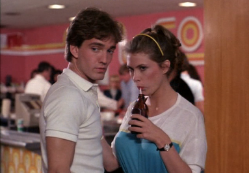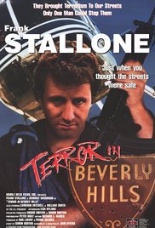
 When terrorists strike L.A.’s posh Rodeo Drive in the Reagan/Bush era, there’s only man to call: Stallone.
When terrorists strike L.A.’s posh Rodeo Drive in the Reagan/Bush era, there’s only man to call: Stallone.
As in Sylvester, of course. But when the producers of Terror in Beverly Hills couldn’t afford him, they went with his brother.
As in Frank, of course. But when the producers of Terror in Beverly Hills couldn’t pay him past two days of filming, he walked. No problem! Willard actor-turned-writer/director John Myhers just assigned the scenes he hadn’t yet shot to this film’s next best thing: some other guy who isn’t really introduced, perhaps in hopes you won’t notice; he just kind of shows up and sticks around. I suppose a real-life analogy would be opening night on Broadway, with the understudy taking over for an ill leading man, and the program neglected to include an insert announcing the change. You won’t mind; with the move pushing Terror deeper into the terrible soup, the movie becomes that much more entertaining.
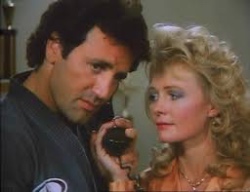 A Middle Eastern terrorist group arrives in the 90210 ZIP code and shoots up a clothing store in order to kidnap one particular shopper: the U.S. president’s adult daughter (Lysa Hayland, Fatal Passion). Mastermind Abdul (Behrouz Vossoughi, Time Walker) holds her hostage and demands the release of 55 Palestinian prisoners. The president (William Smith, Maniac Cop) calls the police captain (Cameron Mitchell, Deadly Prey), who calls former Special Forces officer / current karate dojo owner Hack Stone (Stallone) into action … or at least Myhers’ idea of action. His flick really should be titled Terror at the Old Bean Factory, because that is where most of it takes place and how characters keep referring to that location.
A Middle Eastern terrorist group arrives in the 90210 ZIP code and shoots up a clothing store in order to kidnap one particular shopper: the U.S. president’s adult daughter (Lysa Hayland, Fatal Passion). Mastermind Abdul (Behrouz Vossoughi, Time Walker) holds her hostage and demands the release of 55 Palestinian prisoners. The president (William Smith, Maniac Cop) calls the police captain (Cameron Mitchell, Deadly Prey), who calls former Special Forces officer / current karate dojo owner Hack Stone (Stallone) into action … or at least Myhers’ idea of action. His flick really should be titled Terror at the Old Bean Factory, because that is where most of it takes place and how characters keep referring to that location.
Stallone is hardly in the film; he appears at the beginning and then swoops in toward the tail end, in order to unload ammo into Abdul and anyone else who looks like a “filthy Arab,” to borrow the earlier words of an overdubbed white woman who dares enter an airplane lavatory after Abdul’s worried bodyguard (Sam Sako, Hidalgo) drops a mile-high deuce. Mitchell, meanwhile, pops up every now and then to shout his lines through bourbon-soaked breath, sometimes at the local TV newsman (Brian Leonard, Saint Jack) who unintentionally steals the show with his Jon Lovitz-ian lines, read at the rat-a-tat-tat speed of a Ben Hecht screwball screenplay: “Thanks, hon! The check’s in the mail!”
Cash that check in. And then rent this misfire of massive proportions. In terms of trash, it amounts to a hill of beans. —Rod Lott

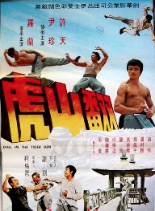
 Sorry, folks, but
Sorry, folks, but 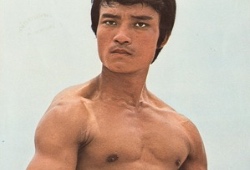
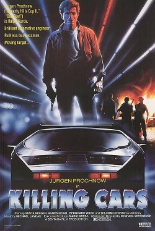
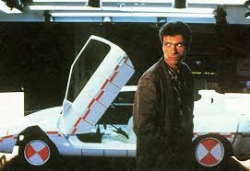
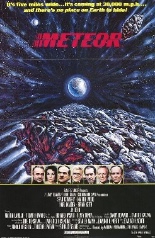
 Remember the late-’90s resurgence of that quintessentially ’70s genre known as the disaster film? Although short-lived, audience enthusiasm for it was so strong that in the summer of 1998, two space-rock epics —
Remember the late-’90s resurgence of that quintessentially ’70s genre known as the disaster film? Although short-lived, audience enthusiasm for it was so strong that in the summer of 1998, two space-rock epics — 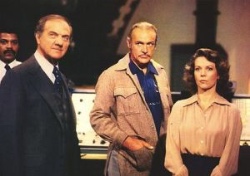
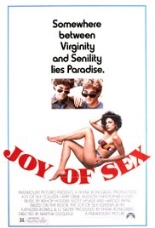
 Based on Dr. Alex Comfort’s
Based on Dr. Alex Comfort’s 